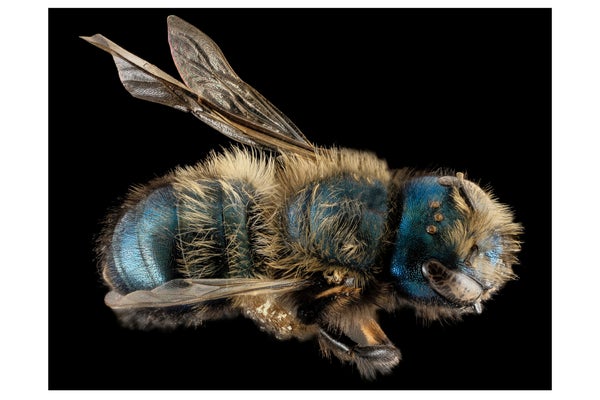The almond industry contributes an estimated $21 billion annually to California’s economy and it is completely dependent on honeybees for its existence. For eight years the Wonderful Company, the world’s largest almond grower, had been funding a large research project to breed another commercial pollinator—Osmialignaria, aka the blue orchard bee, or BOB—to help the beleaguered honeybee in their vast orchards. Researchers and growers worldwide were keeping a close eye on the program’s progress. But in February 2018, right when a new generation of BOBs was to fly into the orchards, Wonderful canceled the program. Why? And what does this mean for the vital pollinator business?
Blue orchard bees are premier pollinators of early-blooming fruit trees like almonds. Several hundred female BOBs can do the work of a hive that contains 10,000 honeybees. BOBs are completely different kinds of bees, so they are managed differently. One of the key problems inhibiting their widespread use has been the inability of breeders to propagate large numbers of them.
In the mid-2000s, when honeybees were really struggling, several companies started propagating blue orchard bees inside large, netted production cages. Chief among them was Paramount Farming, which was renamed Wonderful Orchards in 2015. Joe MacIlvaine was president of Paramount at the time and says he wanted to pursue an alternative bee because it made him nervous that the honeybees were “our sole means of support.”
On supporting science journalism
If you're enjoying this article, consider supporting our award-winning journalism by subscribing. By purchasing a subscription you are helping to ensure the future of impactful stories about the discoveries and ideas shaping our world today.
Since 2009 Wonderful’s BOB project had been run by Director of Bee Biology Gordon Wardell. Cracking the propagation problem was a primary focus. His goal was to raise one million female BOBs inside 20 acres of netted cages, and it seemed Wonderful was on the cusp of success. Wardell had hoped he might reach that goal in 2018, although admittedly he had hoped for that in 2017 as well.
Given that, the February announcement seemed sudden. (Indeed, Scientific American had just published a detailed article about the program.) Managers at Wonderful declined to be interviewed for this article, and Wardell was not available for comment. But when asked why the company decided to discontinue the program right as the BOB season was about to begin, Mark Carmel, director of corporate communications, replied in a written statement, “We’ve determined that continuation of the program is not financially feasible. In addition, we were unable to consistently achieve the level of female replication needed to make the program successful.”
Fortunately, Wonderful’s bees will not die with the project. Jim Watts of Watts Solitary Bees has purchased them. The research will not be shelved, either. Wonderful Orchards allowed a variety of U.S. Department of Agriculture and university scientists to conduct their own BOB research there. Bill Kemp, who recently retired from the USDA and had worked with the BOBs for years, wrote in an e-mail that Wonderful's massive project showed “it was possible to mass produce Osmia lignaria at a scale thought previously unimaginable.”
What may happen to the BOB industry, now that such a big player has pulled out? The consensus among the scientists and industry workers contacted for this article is that the pursuit of BOBs as a viable alternative pollinator will continue. Even though the million-female goal had not been reached, “the proof of concept is there,” says Theresa Pitts-Singer, who works at the USDA Bee Biology and Systematics Laboratory and has studied BOBs for years.
Watts notes, “I think Wonderful has figured it out. Five years ago it was complicated, but they’ve shown the path.” Pitts-Singer says Wonderful’s withdrawal “might negatively impact confidence in the supply of these bees, but the fact that it can happen is now known.” She adds, interest in the bees is strong and says, “the industry has moved forward enough—both in in-orchard propagation and other attempts at mass production—that [progress] will continue, but the pace might be a little slower.”
Meanwhile, in Wonderful’s vast almond orchards, the honeybees will have to do the job alone.
